The Drunks, The RSC - 24th August 2009
I go to the RSC fairly frequently, a couple of times a month if I can afford it - you might say that I'm a bit of a junkie - but I don't often get round to jotting down my ideas about what I've seen (though I think there's probably a post coming up about this season at the end of September). On Monday though I went to see the company's newly commissioned play by Mikhail and Vyacheslav Durmenkov, The Drunks. As I said on Twitter, every now and then I see something I almost don't want to share with anyone else because it speaks to me - I connect with it - in an incredibly personal way. This was one of those times, so I thought I'd like to try and get some of my thoughts down a little more lucidly.
Firstly, I think I should admit that I'm not sure this is a play that everyone will enjoy. It operates on a personal level and the ideas expressed as well as the highly stylised manner in which it is presented will either work for you or it won't. The central themes of identity, power and control and the lack of those things resonated with me. It is the individualisation of these ideas that interest me. If this was a simple presentation of a power struggle within a Russian town, I would not be as fascinated.

(Ilya)
POWER
The story is on a basic level the tale of a soldier Ilya who returns, shell shocked, to his home town to find it in the midst of a struggle for power. More accurately this play is about dozens of power struggles, both externalised and internalised, from all of the towns inhabitants - with two notable exceptions, Ilya and Kostya, who I will come to later.
Most obviously we see this in the three faces of Russian democracy that we are presented with:- The Mayor, Kotomstev and Sergey. The Mayor is in power but he has lost the support of his electorate, his control is shaken; Kotomstev, the head of police, desires power and is denied it while he also struggles for power over his own violent desires; Sergey, the editor of the newspaper, desires change but does not even hold authority over the name of his paper. This sense of furious powerlessness is reflected again and again through the minor characters in the play:
"I can't go on like this any more. This state of affairs. I'm fundamentally opposed, I want to state my fucking opposition, d'you understand?... This isn't a life, it's like some sort of prison..." (Second Barfly, Scene 8)
"Well, what I want to know is, when are they going to stop turning the hot water off in the middle of winter? Eh?... We're living in the Stone Age here..." (Plump Woman, Scene 11)
Opposing this powerlessness is the fierce desire for control. For example, Kotomstev's lack of power reveals itself more clearly in his extreme presentations of power within his own demain, particularly within his torture chamber of a dungeon where he is the sole tyrant. More subtly, we see this desire presented in two speeches: the first by Babitsky, Ilya's former teacher, and Natasha, his former wife:
"But Ilya, if you'd really cared about us - you could have got out of being conscripted. You didn't even ask if I wanted you to stay. We could have come up with something, bribed somebody... But no, you did what you were told because that's what you've been taught. The state says we're at war so you go to war. Well I was taught the same things as you, I know what 'duty' means, but after he was born, I suddenly understood - there is no state. Fuck the state. The state's got nothing to do with me and him." (Natasha, Scene 16)
"There's only one thing you have to do. Believe in me. You don't need to love me, like you love your parents. You just need to believe in me. Even when I tell you things that seem unbelievable, you just have to remember: the only truths in the world are the ones I'll tell you... So why should you believe in me?Well, I'll tell you why. Because I'm your teacher. That's why. That's the proof. I. Am. Your. Teacher." (Babitsky, Scene 2)
Ilya, the cental character, serves as an excellent mirror for these issues - he is essentially the most powerless character within the play. Yet he is also the only character who truly does not desire any power allowing the audience an outsiders perspective upon these internal struggles. His weakness also has another effect, it provokes people to reveal themselves at him - the other characters speak at him not to him, simply because they know he does not truly understand. His confusion palpable. For me these scenes were both the most emotionally effective and some of the most infuriatingly cruel to the character from my perspective.
It is also where the cruel irony lies that it seems to those embroiled in their battle that Ilya alone, uninterested as he is, holds the key (symbolic or otherwise) to their own success.
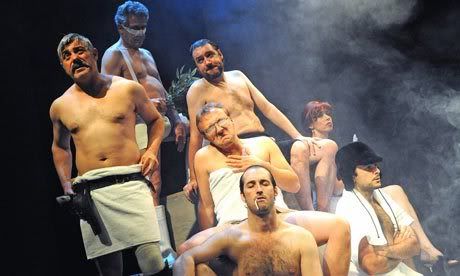
(Kotomstev, the Mayor and Kostya - very sad not a proper shot of Kostya - and various
lackeys at the front. In the Banya,)
IDENTITY
Babitsky's opening speech also introduces the second major theme of the play - identity and the formation of identity:
"But I'm going to help you all to become someone. Someone special. Unique if you like." (Babitsky, Scene 2)
As much as the characters are struggling for power, they are also struggling to to form and undestand their own identities. This struggle as well it is a issue experienced both by individuals and the town as a whole:
ILYA: 'Democracy Street...'
BABITSKY: They just renamed it. Used to be called 'Communist Street'. Before that 'Blood-Letting Street' - a doctor lived here, time of the Tsar...
(SCENE 11)
It is not difficult to see how both the issue of power and of identity are relevant to Russia today, as it continues working through the legacies of communism and it's collapse. One scene that I thought particularly successfully captured the complications of identity for Russia and many other countries was the club scene, where both Russian characteristics and Americanisation were evident and occasionally clashing. The scene was also, frankly, hilarious.
In a talk about the play, the Durnenkov brothers highlighted how drink is also a unifying force for the town, if a negative one. It gives them a shared identity - The Drunks - and is a way, even more so than his absence, that Ilya takes on the role of stranger or outsider. He can not drink, he is excluded. The title also had a further connotation in the original Russian - it has a sense of enchantment, intoxication, a disconnection from reality. Which suits the play perfectly.
The issue of identity a personal level is once again ably represented in the figures of the Mayor, Kotomstev and Sergey, each of whom are struggling to match their idealised vision of themselves with the reality. The mayor sees himself as a benevolent leader, but instead feels he has to resort to force and violence; Kotomstev sees himself as a knightly defender of virtue but instead is a violent tyrant; whilst Sergey sees himself as the intellectual but lacks the force of his own beliefs.
Unlike the power struggle, however, this is an issue in which Ilya himself is embroiled. As he tries to understand how he alligns himself to the two identities that others have placed upon him - the hero and the mundane, the brontosaurus (mastodon in the text). The heroic identity is particularly interesting as it's one almost entirely forced upon him from outside - from people who don't believe it themselves. It is the same people who are calling him 'cripple' and 'gimp' and 'gayboy' that are simultaneously marking him as a hero. From start to finish we see people trying to form Ilya into the shape they want. Yet the shape itself becomes real and powerful to them all - they are both manipulating him and investing in the lie. The only one who is truly powerless is the one they believe will empower them.
"... we haven't much to be proud of. Until now. Now, suddenly, we have a hero; a prodgigal son. A brave soul, lost in the purgatory of war, mortally damaged but somehow he survived, et cetera, and now he's come back home. It's a good story." (Kostya, Scene 9)
"Don't you get it? He's a hero. He can say or do anything he likes and no one can do a fucking thing about it... He'll tell the truth, he'll cut through all the fucking bullshit - because he's a hero." (Second Barfly, Scene 8)
"Well, all I'm saying is, when you're elected, don't forget about us. That's all I wanted to say. That's it." (Plump Woman, Scene 12)
Even another old soldier, a potential ally, the one person who should understand what Ilya has experienced and what he is experiencing, is more interested in how Ilya can speak for him:
"All of these jokers here - they know fuck all about the war! Fuck all! They didn't have a fucking shell fall on their bonces! Just you and me. We're the only ones who really know what it's like! Got it? So just go up there and show them, you tell them how it really is." (Elderly Man, Scene 19)
This idea of himself as a hero though is of little interest to Ilya, beyond the fact that it is making everything around him seem insane - it is the earlier identity placed upon him, that of the brontosaurus, that continues to trouble him. Because this is also a story about Ilya and the town as a whole, discovering it's place in it's surroundings and it's sense of itself and it's own failings.
ILYA: We used to play a game - 'Save Your Dinosaur'? We had to make speeches-
BABITSKY: Yes, in defence of your dinosaur...
ILYA: Yes, but I was always the brontosaurus. Why was I always that one?
BABITSKY: The brontosaurus' a very fine dinosaur.
ILYA: No, it isn't. It's the clumsiest, stupidest dinosaur. It just chews leaves all day. That's all it fucking does. Why was I always the clumsy stupid one? The vegetarian?
(SCENE 11)
SERGEY: Because you're a hero. You think you're weak but you're not, you're strong. You were always stronger than any of us. You've been out there fighting for your country, you sacrificed everything -
ILYA: So did a lot of people. What's so special abour mw?
SERGEY: What's so special about you? You're Ilya. The bravest and strongest of all of us. You're the brontosaurus!
ILYA: Yes, I'm the brontosaurus.
(SCENE 18)
This for me, this contrast between what Ilya is and what he wishes to be and what others expect him to be is where he moved from simply being an effective viewpoint character for the power struggles - to being a character I truly cared about. I was invested in his journey, my heart broke for him and Jonjo O'Neills performance of the character was beautiful and understated and powerful. The conclusion of Ilya's story, which I am aiming not to spoil, also gave me what I think of as a 'reverse reaction' - I react to an event the opposite of how I would expect - so at the end of the Tempest as Ariel is released from slavery I felt grief (beautiful grief, but grief all the same) and at the end of The Drunks my heart sang for Ilya. At the end he was still broken and damaged and the brontosaurus but he was also empowered.
A side effect, however, of Ilya's central place in this identity struggle is that he is no longer the outside figure that allows us to view the events. To fill this position, however, we have the figure of Kostya. If Ilya is the most powerful vision of a loser in the piece, then Kostya is the closest we have to a winner by the end. She is also a character that I find entirely fascinating as, in a departure from the printed text, the RSC has chosen to portray Kostya as a trangendered mtf. This is perhaps where I'm most intrigued about their decision making, particularly given that Russia is currently facing a difficult period in terms of lgbt rights. The play itself, to some extent, does a good job of challenging ideas of heteronormatism - as well as Kostya, a central figure, we also see a male pole dancer and his gay client and the RSC production highly implies that Sergey is a closeted homosexual - his own denial of his sexuality bringing another element to his identity struggle. I like as well that these sexual identities while being strong components of the characters do not define their purpose within the story.
Kostya in obvious contrast to Sergey appears fully comfortable in her new identity - she is posited at the end of an identity struggle, having changed into something new - and is shown as confident and in control and in a position of power admidst the political rivals - involved in their struggles but not invested in them. And she alone at the end of the play has not been dragged down, visually standing above the rest.
"I like to think that I've evolved." (Kostya, Scene 18)
[On her political machinations for the Mayor, Kotomtsev and Sergey] "Yes. It's all rather thrilling, isn't it? Plates spinning... dice rolling... everything in motion... but in which direction, Ilya?... In the most interesting direction possible. And it's not over yet." (Kostya, Scene 17)
Not only does Kostya seem to have revolved her issues of identity, she also grants us one of the plays central lessons, that no one is truly powerless - limited perhaps - but not powerless.
"But you have a choice , Ilya. You can choose to die. Or you can choose to evolve. But you do have to choose."
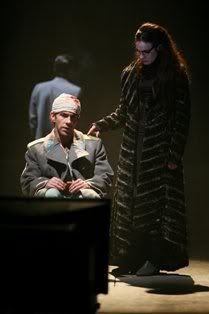
(Ilya and Natasha)
THE PRODUCTION
I have already referred to several elements of the RSC production of the play, but I though I should also address this more directly as it is almost a character in it's own right.
A lot of the press reviews referred to it in comparison to Gogol's The Government Inspector - I can see where they're coming from, a 'stranger' comes to town and finds himself at the center of a whirlwind of government corruption. I don't really agree, however, although stylistically there are similiarities - Ilya is not Khlestakov. Ilya is Alice falling through the rabbit hole, Sarah being pulled into the Labyrinth, Dorothy landing in Oz. The play has the sense of fairytale about it, at it's heart it's a morality tale, and like our heroines he is surrounded by a fantastical world where things don't make sense.
There's a very clear split between before Ilya's accident and after - the before, despite featuring adult actors playing and games of make believe, has a much more realistic style - once his skull has been shattered there is singing, characters emerging from boxes and walls, torture chambers, the world freezing, characters trippled, statues coming to life... it's stopped making sense. It's an element I love about the show and one I think they pull off really well.
The production is highly stylised - reminiscent in places of the absurdity of Monty Python or the grotesqueness of Shock Headed Peter - it is certainly not subtle. Set (I was impressed by the simple flexibility of the pieces, certainly showing the inspiration of Meyerhold) and lighting and music all boldly create a chaotic swirl, plunging us into Ilya's mental state. I was particularly drawn by the use of repetition in various elements throughout the play. Overall it is frequently confusing and unsettling and is certainly not comfortable - all of which is fantastic for the overall feel of the play. The decision to discard the traditional interval also, I believe, plays well into this.
The play is also hilarious - while managing to be horrific in places and heartbreaking in others. I was carried away by the momentum and truly captivated.
The actors are, of course as you would expect from the RSC, all superb. Managing to hold onto the emotional truth of the moments inside the madness. As well as Jonjo O'Neill - Brian Doherty (The Mayor), Darell D'Silva (Kotomtsev), Christine Entwhisle (Kostya) and Richard Katz (Sergey) all stood out for me, though it seems unfair to single out these individuals in such a strong overall cast. It was also clear that they were passionate about this piece.
Understandably there were some moments that did not work as well as they might, but I expect that when I'm going to previews - in the end it just makes me more excited for my second trip to the play. Which will hopefully be soon.
All in all, it may not be a play that works for you - but these are some of the reasons that it worked for me. Also, apologies if this is less coherent that I originally hoped - I have consumed a reasonable amount of whiskey tonight and I'm currently sat in a bath in a hotel room (trying not to disturb my room mate).
Sometimes life - like art - is just really fucking strange.
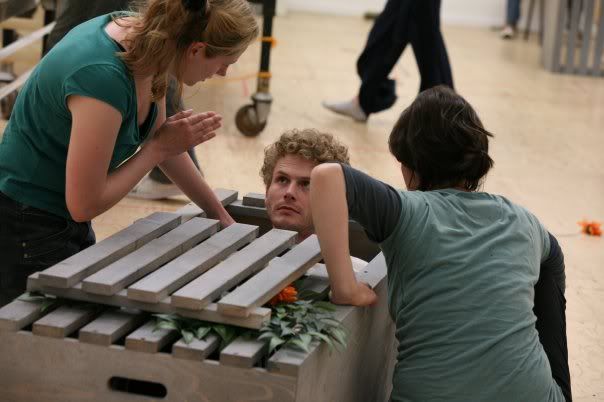
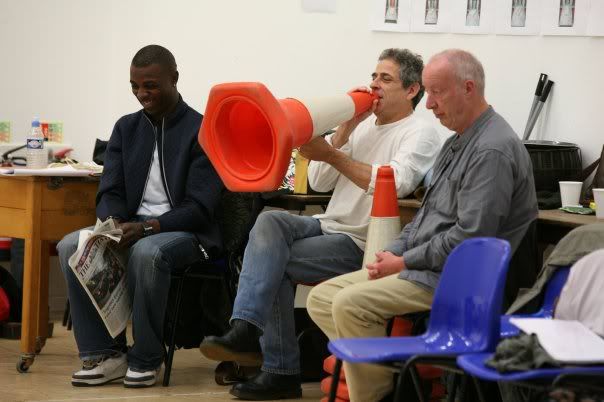
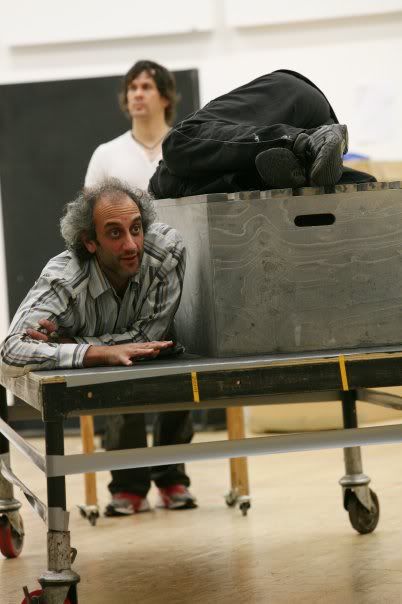
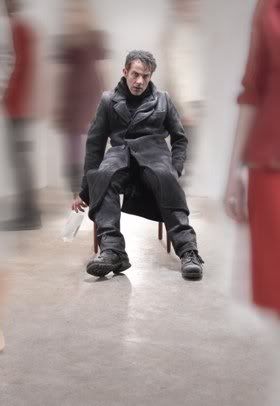
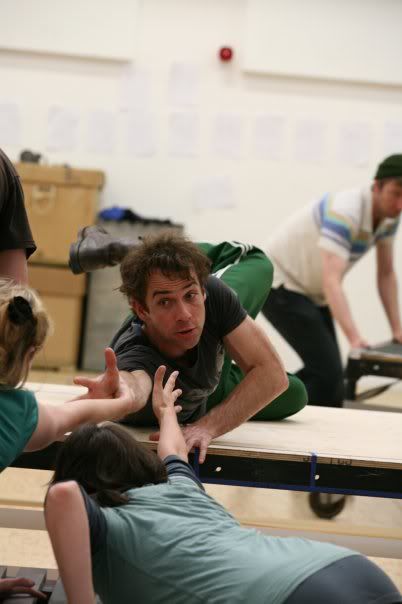
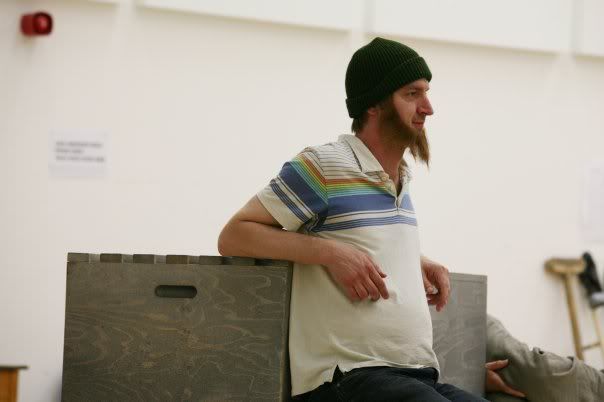
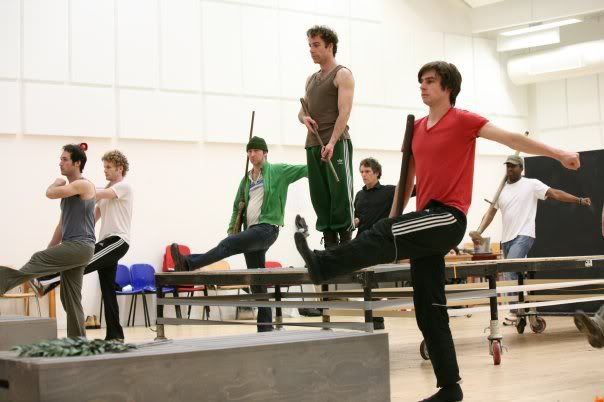
(Rehearsals)